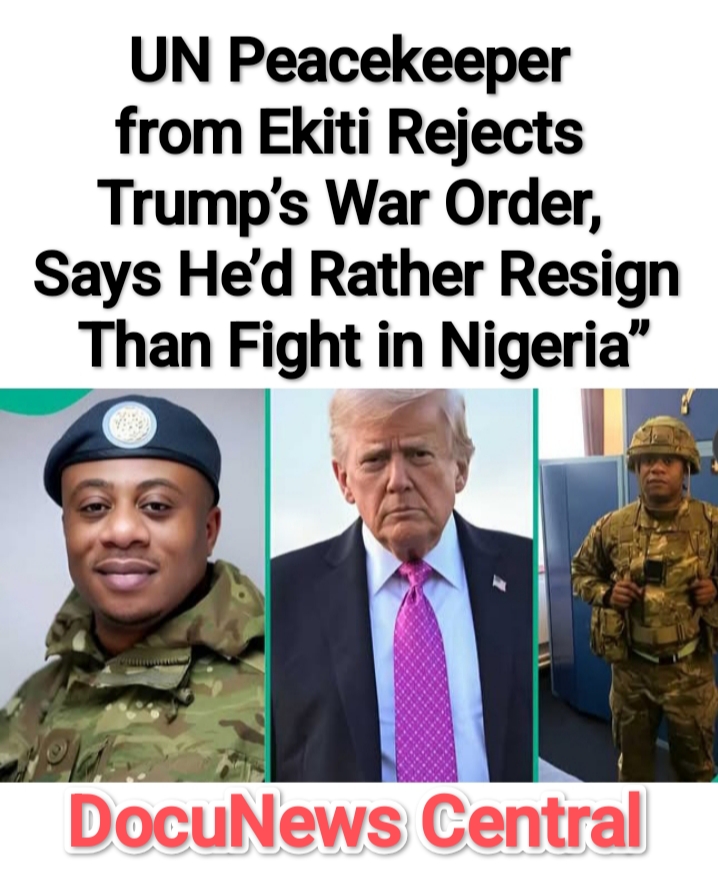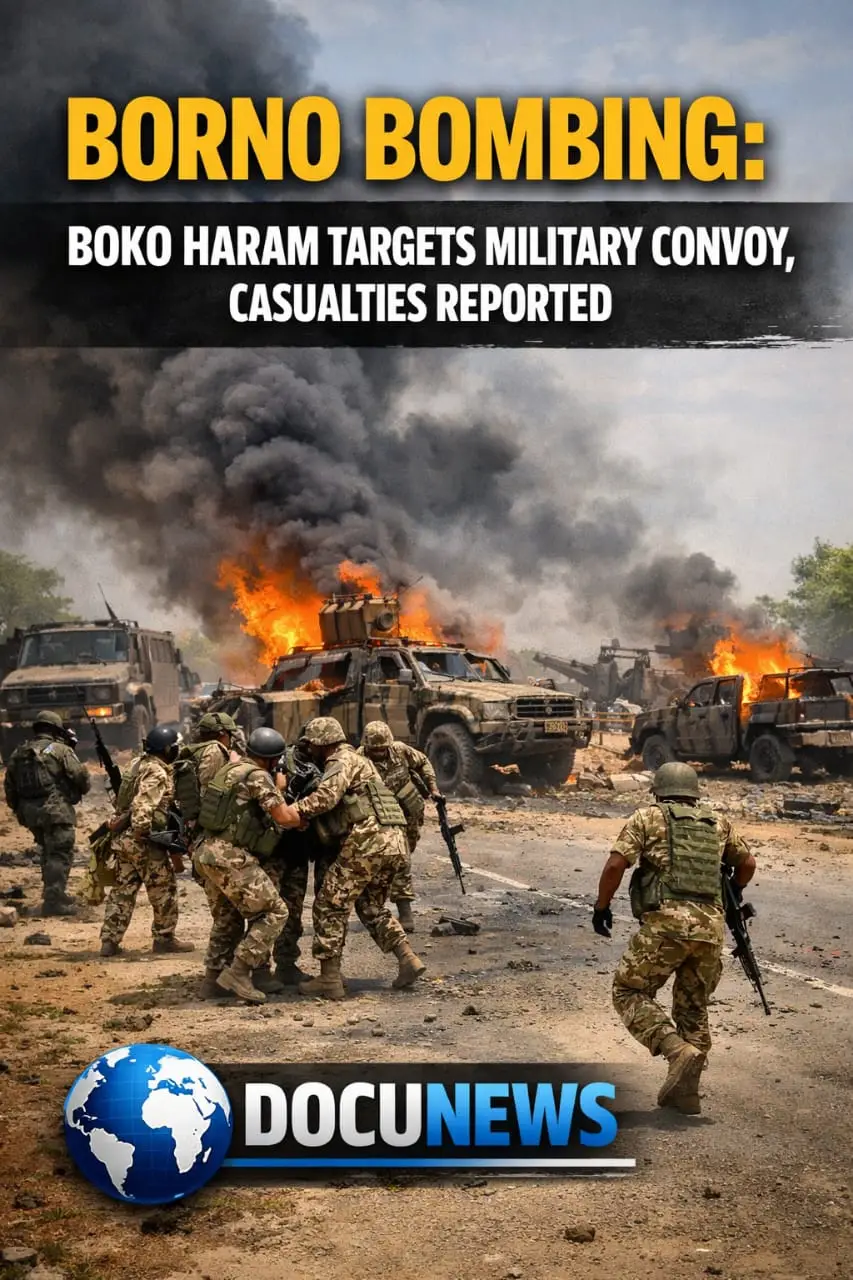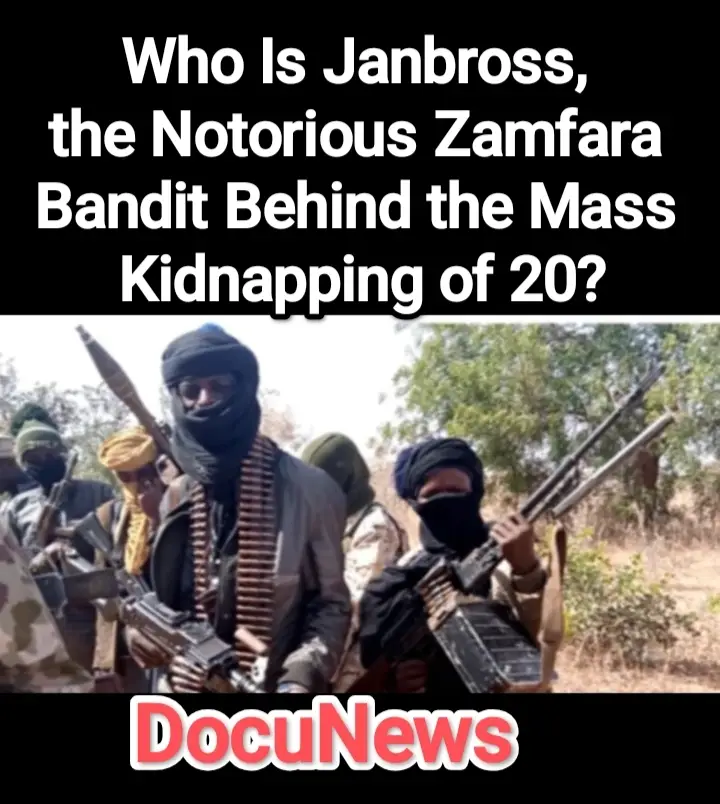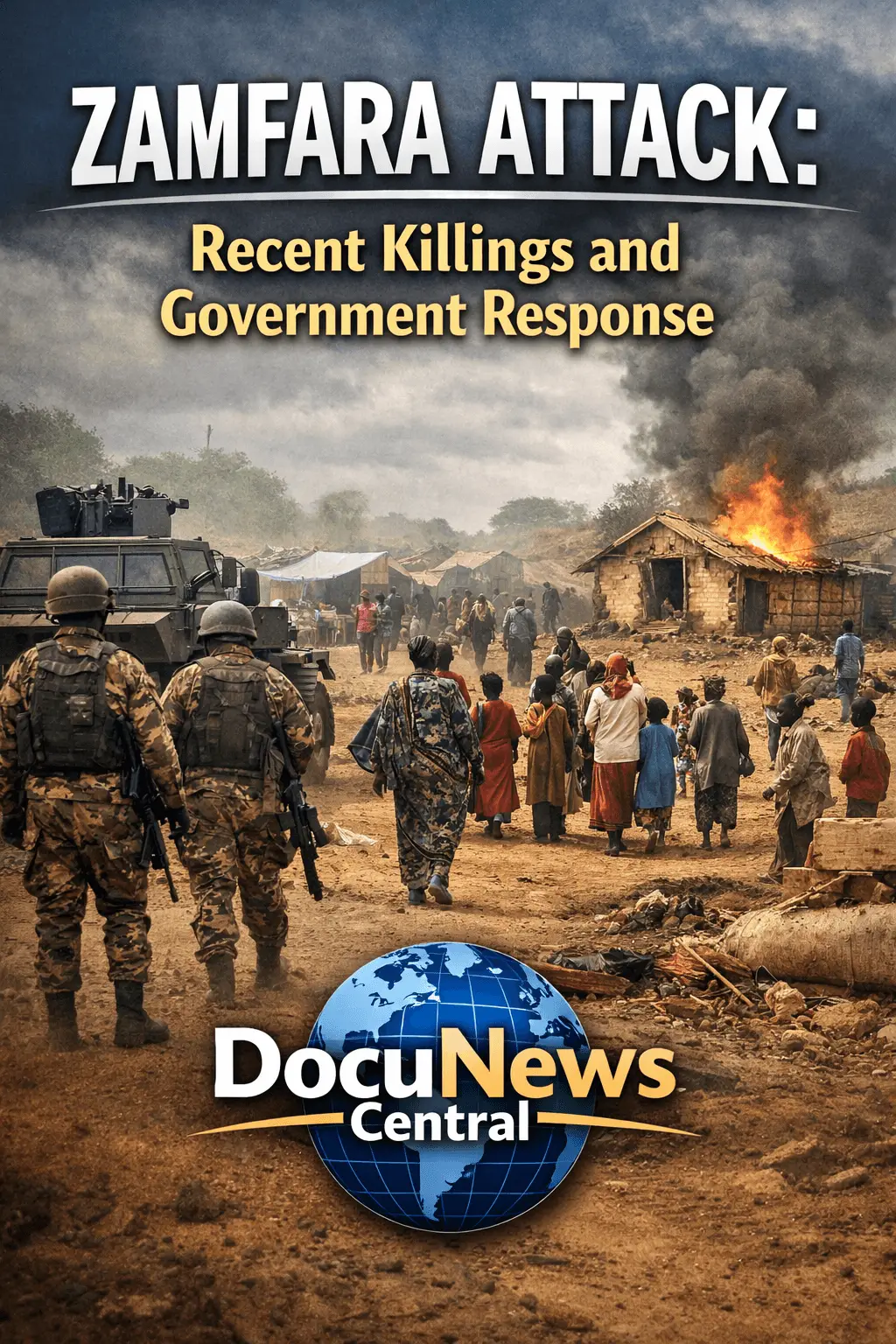
In a striking declaration, a soldier from Ekiti State, Nigeria — currently serving in a United Nations peacekeeping mission — has publicly vowed to resign rather than comply with what he describes as an order from Donald J. Trump to engage militarily in Nigeria. His statement, deeply rooted in national identity and personal conviction, raises significant questions about duty, loyalty, and the role of international peacekeeping missions.
His Statement and Context
The individual, identified as Falegan Opeyemi David, hailing from Ekiti State, serves abroad under the United Nations. In his post on Facebook, he wrote:
“If Trump gets involved in the Nigerian case, then the United Nations will get involved. Imagine being ordered to wage war in your home country. I would rather quit the military than fight in my home country. Even though terrorists are the target, I might fight for my home country to conquer bandits and terrorism. To be honest, I would rather quit the military than get involved. Nigeria is my hope. Ekiti is my life and source.”
He emphasised that while he remains committed to defending his homeland — especially in the fight against terrorism and banditry — he will not be ordered to attack his country under an external directive. This statement has sparked national conversation in Nigeria.
What He’s Standing For
- Loyalty to homeland: His refusal is founded on the belief that his home country and state are not adversaries. Though he serves internationally, his identity remains anchored in Nigeria and Ekiti specifically.
- Defence vs. offensive orders: He draws a clear distinction between defending Nigeria (e.g., combating terrorists or bandits) and being used to fight against his own country under an external order.
- Sovereignty & peacekeeping ethics: If a directive comes from an external power (in this case the US) to act militarily in Nigeria, it raises serious questions of sovereignty, chain-of-command ethics, and the mandate of UN missions.
- Personal integrity: For him, the decision is about conscience over compliance — choosing to protect his national identity rather than execute orders he considers inappropriate.
Why This Matters
This story carries weight across multiple dimensions:
- Military & peacekeeping ethics: The role of peacekeepers is generally to maintain or restore peace, not engage in offensive warfare under external orders. His refusal brings into focus the ethics of command and individual responsibility.
- National identity vs. international duty: Soldiers in international missions often balance dual identities — loyal to their country of origin while serving under a global mandate. When those conflict, tension arises.
- Geopolitical implications: With the United States threatening possible intervention in Nigeria over alleged human-rights violations and security issues, the participation (or refusal) of Nigerian soldiers in such scenarios highlights limits of external leverage.
- Public resonance in Nigeria: His statement has resonated with Nigerians who view it as a stand on sovereignty and national pride, particularly given his Ekiti roots.
Broader Background: Nigeria, UN Peacekeeping & US Threats
Here is the wider context that makes this statement all the more significant:
- Security landscape in Nigeria: Nigeria has long grappled with insurgency, banditry, communal violence and other major security challenges. These attract both domestic and international attention.
- UN peacekeeping role: Nigeria is a contributor to UN peacekeeping missions. Its soldiers abroad operate under UN mandates though they remain Nigerians first; this dual role can become complex when national and international interests diverge.
- US threat to Nigeria: On November 1, 2025, President Trump announced he had ordered preparations for possible US military action against Nigeria unless the Nigerian government addressed alleged persecution of Christians and other security concerns. Nigeria rejected the threat and emphasised sovereignty.
- Individual reaction: In this context, the Ekiti-born soldier’s decision is not just personal — it is emblematic of a broader resistance to what may be viewed as external military intrusion or override of national will.
Risks & Consequences of His Stand
His public refusal could entail several consequences:
- For him personally: Refusing a legitimate military order can carry disciplinary or career repercussions. If he resigns, he may end his peacekeeping/military career — but he appears ready to accept that.
- For the UN mission: When individuals in multinational missions are unwilling to act against their home nations, it raises logistical and ethical questions for mission leadership.
- For Nigeria’s government and public opinion: His statement fuels national dialogue about sovereignty, foreign intervention and the role of Nigerians abroad in global missions.
- For U.S. and international relations: When external powers issue threats and individuals within the target country’s system resist participation, it complicates intervention strategy and signals limits of external influence.
Ethical & Philosophical Considerations
Some deeper lessons emerge:
- Obedience vs. conscience: Military structures emphasise obedience; yet when orders conflict with personal or national loyalties, individuals face ethical choices.
- Nationality vs. international mandate: Serving under a UN banner implies neutrality and global duty — but if that duty asks you to act against your homeland, the conflict becomes acute.
- Sovereignty vs. humanitarian intervention: The U.S. frames its threat as a response to human-rights violations; Nigeria frames such intervention as a sovereignty issue. The soldier’s stance aligns with the latter.
- Personal integrity and national identity: His posture shows that identity, values and roots matter deeply — even in an international context.
What Could Happen Next?
Several possible developments may follow:
- He may formally resign from his UN assignment or national military service, if the order to act against Nigeria becomes official.
- The Nigerian public and political actors may reference his stance in debates on sovereignty, foreign ties and defence policy.
- The UN and Nigerian military leadership may review protocols to ensure that nationals aren’t placed in direct conflict with their homeland under external orders.
- If U.S. pressure escalates, statements like his may strengthen Nigeria’s resistance to external intervention — or prompt diplomatic recalibration.
Final Thoughts
This vow — not to obey an order that would take him against his homeland — is deeply symbolic. It speaks of identity, duty, values, and the complex web of international, national and personal obligations that soldiers in today’s world must navigate.
From a broader perspective, it reminds us of the limits of external military intervention, the power of individual conscience, and the continuing importance of national allegiance — even in globalised peace-operations.
For Nigeria, Ekiti State, the United Nations, the United States and the global community alike, this story begs some key questions:
- What is the role of the individual soldier in a globally interconnected world?
- When does a peacekeeping mandate become an instrument of foreign policy rather than neutral peace service?
- How do nations and institutions respect personal, national and international loyalties at once?
The soldier from Ekiti has provided his answer: my country first, my conscience next—and orders that conflict with both—no. In doing so, he may well inspire others to reconsider where true duty lies.
Related Reading on DocuNewsCentral
- WAEC 2026 Subject Combinations: Fact-Checked Update and Media Reports
- CAF’s New Qualification Format Gives Super Eagles a Fresh Chance
- Indian Plane Crash – A Fellow Pilot Said What He Believed Caused the Crash
- Customs Officer Dies in Hotel Room After Spending the Night With Two Ladies
Published by DocuNewsCentral. All rights reserved.










